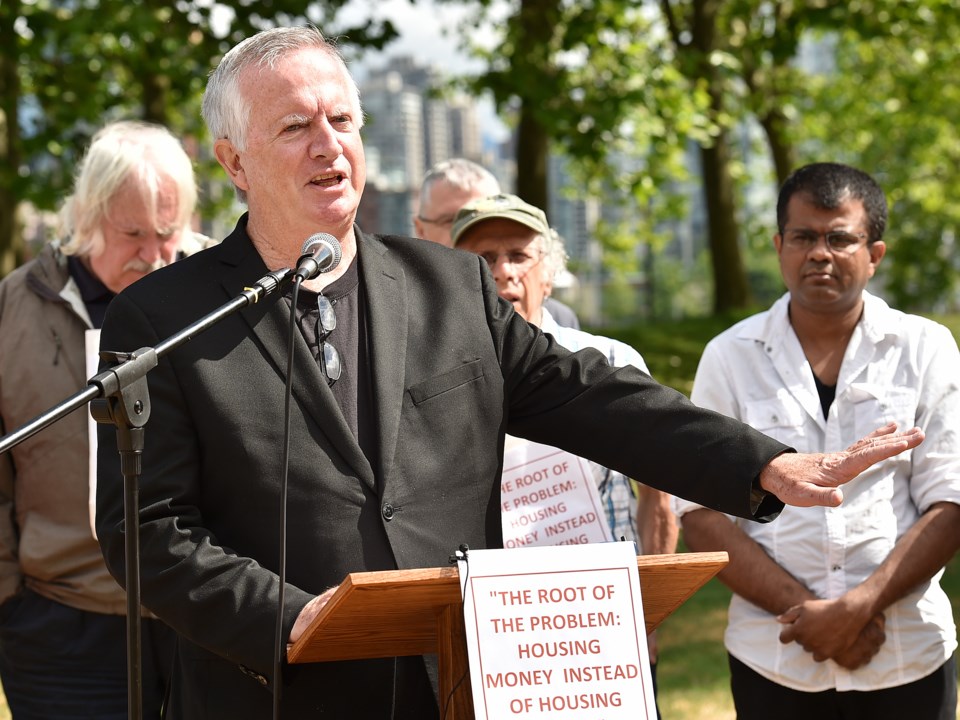The University of B.C. professor who was likely to be chosen COPE’s mayoral candidate suffered a stroke Tuesday in his home state of Massachusetts and will not be able to continue his campaign.
Patrick Condon, who is in his 60s, announced the surprising news Friday morning in a Facebook post.
“On Tuesday, I was hospitalized with a stroke while visiting the United States,” he wrote. “I have been advised by doctors that I need to concentrate my efforts fully on recovery. Therefore, because I’m not able to dedicate my full capability to the party as it readies itself for the upcoming election, I must end my nomination campaign as a mayoral candidate for COPE.”
Condon is the third candidate in this year’s civic campaign to leave the race because of an illness.
Vision �鶹��ýӳ��mayoral hopeful Taleeb Noormohamed suffered “a sudden cardiac event” in May, forcing him from competing against Squamish Nation hereditary chief Ian Campbell, who was acclaimed as the party’s mayoral candidate.
Last week, longtime Vision school trustee Ken Clement resigned from school board and announced he will not seek re-election this year because of an illness.
Condon was to compete Aug. 19 to become COPE’s mayoral candidate. Many in the party supported his bid and he was likely to be acclaimed since no other high-profile candidates had stepped forward to compete for the nomination.
In his post, the urban design professor said he felt his background in academic research, particularly his “hands-on experience” with other jurisdictions on affordable housing projects and efficient public transit systems was a good fit with COPE, a party with a 50-year history “for seeking a just and sustainable city.”
Meena Wong, Condon’s campaign manager, posted on Facebook that it was “a heavy blow” to have Condon leave the race. Wong, who ran as COPE’s mayoral candidate in the 2014 election, said she joined Condon’s campaign because he was “a can do person.”
“His belief of building a just, fair and sustainable Vancouver, where everyone can afford and enjoy to live and work, resonates with mine,” she said. “Our team of dedicated volunteers and supporters are devastated by the news of his sudden illness. We wish him a speedy and full recovery.”
Connie Hubbs, co-chairperson of COPE, said Friday she was in “a state of shock” after hearing of Condon’s stroke. Her understanding was Condon was in Massachusetts to visit family and help care for a family member who was ill.
“He seemed like a healthy guy, so it just shows you from moment to moment what can happen,” she said, noting Condon was unable to travel. “It’s shocking news and we just want to be very supportive of him and his family, and give them the peace that they need.”
As for party business, Hubbs acknowledged Condon was the “presumptive nominee” for the party but noted he still had to win or be acclaimed Aug. 19. She said COPE members now have three choices: to not run a mayoral candidate; endorse an independent candidate; or support another COPE member to run for mayor.
“You may well see people come forward,” she said. “The people that might not have wanted to run against Patrick, might run now that he’s not there. But time will tell.”
Condon, who was born in Massachusetts and moved to �鶹��ýӳ��in 1992, said in announcing his campaign in early June that he wanted to be the Bernie Sanders of this year’s race; Sanders was one of the presidential nominees for the Democrats in the last U.S. election and his message of providing affordable housing, health care and child care resonated with millions of Americans, particularly the younger generation.
Condon promised to run on a platform that answered to the anxiety, struggle and poverty of many Vancouverites living in an unaffordable city.
“�鶹��ýӳ��needs real affordable housing for the most vulnerable, for working people and for young people and seniors—clearly, they are amongst the forgotten when it comes to our current crop of politicians,” he wrote in Friday’s post, reiterating an earlier statement to develop 50 per cent non-market housing. “I look forward to making a full recovery. I am determined to keep speaking out and will lend support to see that these objectives become reality in the city of Vancouver.”
The election is Oct. 20.
@Howellings



